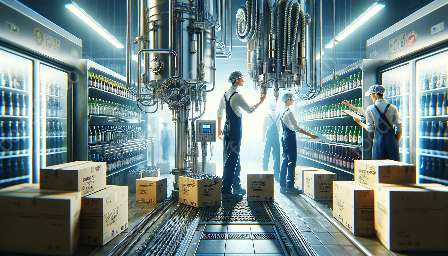Water plays a critical role in beverage production, and ensuring its safety is paramount. In this topic cluster, we'll explore the importance of water treatment, the key considerations for maintaining beverage safety and sanitation, and how this intersects with beverage studies.
Importance of Water Treatment in Beverage Production
Water is a primary ingredient in the production of various beverages, including soft drinks, juices, and bottled water. The quality of water used directly impacts the taste, safety, and overall quality of the final product. To ensure that the water meets stringent safety and quality standards, it must undergo thorough treatment processes.
Water treatment in beverage production involves several crucial steps, such as filtration, disinfection, and purification. Filtration removes particles and impurities, while disinfection eliminates harmful microorganisms. Purification processes, such as reverse osmosis or distillation, help remove contaminants, ensuring that the water is of high purity.
Ensuring Beverage Safety and Sanitation
When it comes to beverage production, safety and sanitation are non-negotiable. Contaminated water can lead to the proliferation of harmful bacteria, viruses, or other pathogens, posing serious health risks to consumers. That's why stringent measures must be in place to maintain beverage safety and sanitation throughout the production process.
Proper cleaning and sanitation procedures for equipment and facilities are essential to prevent contamination. Additionally, regular testing and monitoring of water quality at different stages of production are critical to identifying and addressing any potential risks. By implementing Hazard Analysis and Critical Control Points (HACCP) and Good Manufacturing Practices (GMP), beverage producers can maintain high standards of safety and sanitation.
Intersection with Beverage Studies
Understanding water treatment and safety in beverage production is integral to beverage studies. Students pursuing this field need to grasp the intricacies of water quality, treatment methods, and the regulatory frameworks governing beverage safety. By delving into this topic, they gain valuable insights into the industry's best practices and emerging technologies.
Furthermore, beverage studies encompass the broader aspects of production, distribution, and consumption. Knowledge of water treatment and safety enables beverage professionals to make informed decisions regarding ingredient sourcing, production processes, and quality assurance, ultimately contributing to the production of safer and more wholesome beverages.
Conclusion
Water treatment and safety are indispensable components of beverage production. By prioritizing the quality and safety of water used in manufacturing processes, producers uphold the integrity of their products and safeguard consumer health. This convergence of water treatment, beverage safety, and sanitation forms a crucial cornerstone of beverage studies, enriching the industry with expertise and innovation.

